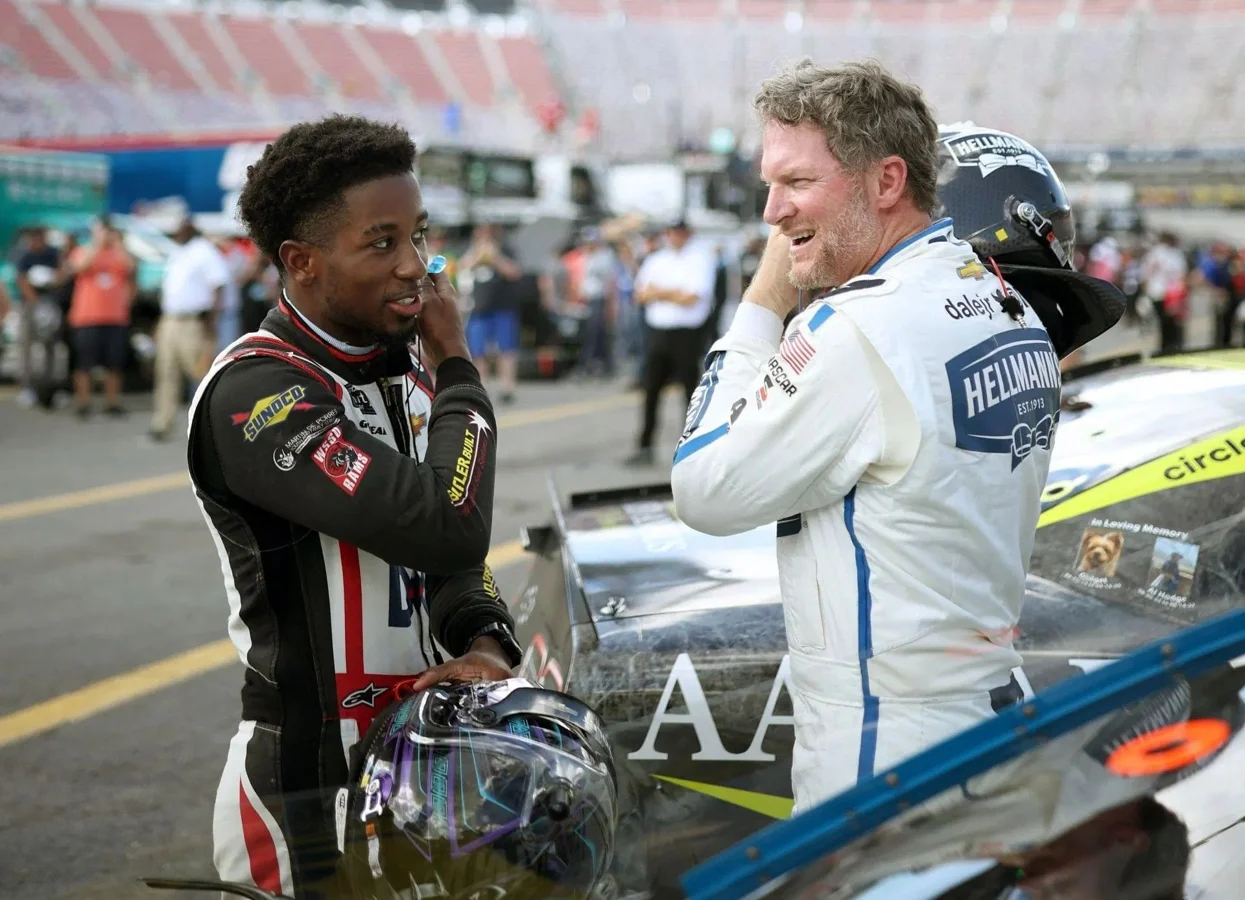During the most recent race weekend at Talladega, Austin Hill was seen making a controversial gesture towards fans after his win, igniting debate within the NASCAR community and prompting a strong Dale Earnhardt Jr reaction. The incident, which involved Hill giving the middle finger as he drove to Victory Lane, drew attention to whether such behavior warrants disciplinary action.
NASCAR fans have a reputation for their intensity and their personal investment in drivers, often leading to heated rivalries and emotional confrontations. Unlike team sports, single drivers like Hill, Kyle Busch, Brad Keselowski, and Chase Elliott become direct targets for fan passion, both positive and negative. Joey Logano and others are also caught in the mix, depending on fan allegiances. This environment makes every interaction between drivers and fans highly scrutinized.
Dale Earnhardt Jr.’s Defense of Austin Hill’s Actions
On his podcast “Dale Jr. Download,” Dale Earnhardt Jr. addressed the controversy before NASCAR released its official penalty report, which ultimately cleared Hill of any punishment for his gesture. Earnhardt Jr., a prominent figure in the sport, provided context for the incident and explained why he believes Hill’s actions were not as egregious as some critics suggest.
“Now, let’s be clear, Austin Hill did not drive – this is Austin Hill driving by the grandstands, driver’s side toward the grandstand, he did not drive down the front straightaway with his middle finger in the air the whole way,”
Dale Jr. said.
“He’s flipping a guy off, and he’s looking directly at the camera, and he’s responding to some fans who are probably two or three dudes in the grandstands that are probably sitting there double-birding him, and he’s just giving it back. And I agree.”
— Dale Earnhardt Jr., Broadcaster and Former Driver
Earnhardt emphasized the unique dynamic of NASCAR, where drivers—rather than teams—become focal points for intense emotions. On his podcast, he suggested that these moments, although provocative, actually contribute to the sport’s drama and appeal.
“We need to embrace this to an extent. We call it out for what it is. They love to hate him, you know? And so, I’m good with it. I agree with this post here about letting it slide because it does add some color. You know, there’s not a lot of people out there willing to be the villain, to be the bad guy, to be the guy that’s, you know, not a lot of guys willing to do that.”
— Dale Earnhardt Jr., Broadcaster and Former Driver
Understanding the Incident’s Nuance
The Austin Hill situation was not a result of physical confrontation, nor did it escalate beyond a fleeting interaction. In the world of NASCAR, such personality-driven moments, while not common, do occur and often add to the sport’s entertainment value. Many drivers and fans alike know that rivalries can become personal, sometimes spilling over into on- and off-track drama.
According to observers and the broad NASCAR community, the fan involved reportedly enjoyed the experience, which adds complexity to the question of punishment. If feelings were not truly hurt, the justification for a fine or penalty becomes less compelling.
Dale Earnhardt Jr. has historically opposed penalizing drivers for heat-of-the-moment reactions when the context is not egregious. The lack of a penalty for Hill appears consistent with Earnhardt’s position on maintaining the sport’s colorful personalities and giving drivers room to express themselves, even if the moment is caught on camera.
The Importance of Context in NASCAR Disciplinary Decisions
“It can’t be so black and white. Look at the context here,”
Dale Jr. said.
“Now, had he done it all the way down the front straightaway as a bird to everybody, I’d say that’s something we need to get him in the room and go, ‘Listen, pal. That can’t happen.’ But this kind of stuff right here, it’s like no different than you know, Kevin Durant going on Twitter and going back at trolls.”
— Dale Earnhardt Jr., Broadcaster and Former Driver
Earnhardt’s comments underscore the nuances that NASCAR officials must examine before assigning penalties. In this case, Hill’s gesture appears to have been a specific response to a small group of fans, not a sweeping or prolonged act of disrespect. Comparisons to athletes like Kevin Durant responding to criticism online highlight how sports personalities today often engage directly with fans, sometimes provocatively, without necessarily crossing the line into misconduct worthy of fines or suspensions.
The decision not to penalize Austin Hill demonstrates NASCAR’s understanding of context and the value of personalities that spark conversation among fans. As the debate moves forward, drivers, fans, and officials will continue to navigate the delicate balance between emotional reactions and professional conduct in a high-pressure environment.
